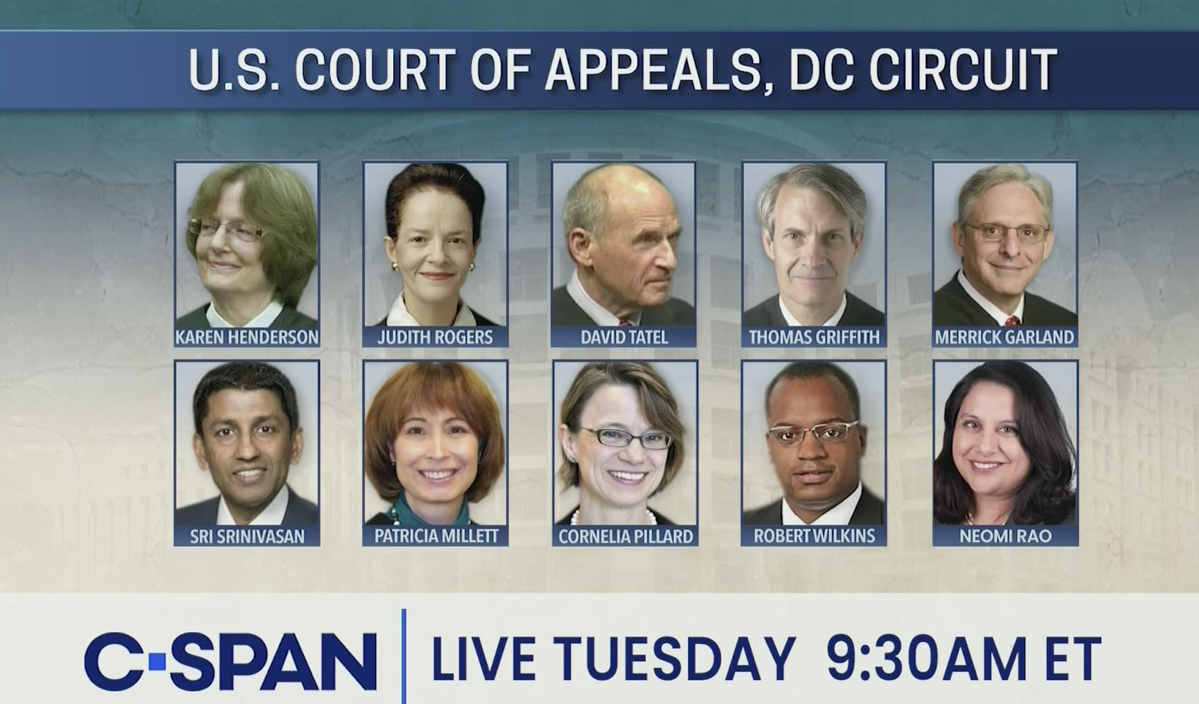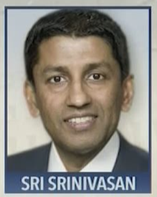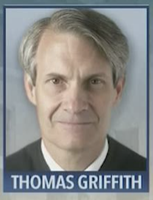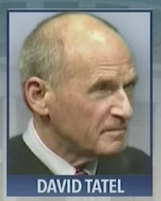I’ll liveblog this (Tuesday, August 11, 9:30am) here at https://www.rasmusen.org/blog1/liveblogging-the-return-of-in-re-flynn/. Just audio, it seems, at https://www.youtube.com/watch?v=97dE1_3e2Po. Alternatives are https://www.youtube.com/channel/UCa63PLarrn0AmtHw-ooYtuw and https://www.youtube.com/watch?v=6yN7u1zyBPs (withe 3 men discussing—nice setup), and in C-Span at https://www.c-span.org/video/?474473-1/michael-flynn-perjury-dismissal-case-rehearing.
#####################################
I got the sense that the judges really really want Flynn to lose, and were searching for technical reasons that weren’t too embarassingly pretextual.
######################################
I wonder if it’s really legal to just have audio. Court proceedings must by law be open to the public unless there’s a good reason for them not to be. If a judge decided to exclude visitors from his courtroom and just pipe the sound out to spectators sitting on the courthouse steps, that would be scandalous. Is that what is happening here?
There have been complaints in my county about local government doing this, probably in violation of an open meetings act. It may be different here, though, because the Court is not concealing anything from us that it isn’t concealing from itself too. The judges do not get to see each other; the judges do not get to see the attorneys speaking; the judges do not get to see the reaction of the audience or the attorneys when a question is asked. This is all bad, but it is equally bad for the judges, so we can’t say they are concealing the proceedings from us exactly– it’s more that they are reducing the quality of the proceedings.
But isn’t that something we have to accept because of covid? No. Let’s put aside the question of whether the attorneys and judges are such louts that they’ll show up infectious and sneeze in each others’ faces. Take that as given: we can’t let them in contact with other human beings. The question remains of why the leading appellate court in the richest and most technologically advanced country in the world can’t figure out how to do video like the ladies who do home cooking shows do (see, e.g., Ahiza Vlogs, How to Cook Mexican Chicken Soup ). I’m on hand to help if Ahiza is too busy to take on any consulting.
For a draft of what would have been my revised amicus brief for In re Flynn en banc and might become an article, see
http://rasmusen.org/papers/enbanc.docx or if you prefer http://rasmusen.org/papers/enbanc.pdf:
how to discipline wayward judges and prosecutors, reassignment, rules civ11, ap35, crim48, mandamus, en banc. All of them exemplify the principal-agent problem. In re Flynn is a veritable zoo for agency theory.
###########################################
George Mason Professor Garrett Jones tweeted of my Rule 48 theory, “I’m sure your theory gets an asterisk or two.But I’m not sure your theory gets a high R-squared.” Nicely phrased. I will think about that. It’s a good way to think about explanatory theories. What he’s saying in econometrics terminology is that my theory is definitely true and explains a few cases maybe, but it doesn’t explain most of what happens.
The case everybody talks about that was behind Rule 48 was a federal prosecutor who went easy on someone with political connections. United States v. Woody, 2 F.2d 262 (D. Mont. 1924). The Montana US Attorney dismissed charges against rich young Woody, and it looked like political favoritism. The district judge was unhappy:
Says the Supreme Court in Confiscation Cases, 7 Wall. 454, 19 L. Ed. 196: “Public prosecutions * * * are within the exclusive direction of the district attorney, and, even after they are entered in court, they are so far under his control that he may enter a nolle prosequi at any time before the jury is impaneled for the trial of the case.” See, also, 16 C. J. 434.
The power to determine whether a case shall be prosecuted to a conclusion must, of course, be lodged somewhere, and by common law the district attorney is made its repository….
The court cannot control him, unless, as in some states, it is given the power by statute. He is not even required to give a reason for dismissal. He may defy what, if any, authority over him the Attorney General has, and prosecute, though directed to obstruct and defeat court and justice by connivance in flight by accused. See U. S. v. Davis, Fed. Cas. No. 14923, much like the case at bar. The court recognizes him alone in criminal prosecutions.
Hence this motion to dismiss must be and is granted, albeit reluctantly.
I don’t know what U. S. v. Davis, Fed. Cas. No. 14923 says, but if logic and the Confiscation Case is to believe, the Montana district judge is flat-out wrong about the Attorney-General not being the principal for the U.S. Attorneys:
Control of these suits, therefore, while they were pending in the circuit court, belonged to the district attorney under the general superintendence and direction of the Attorney General, and he might, if he had seen fit, have discontinued them at any stage of the proceedings prior to the appeals. Such control on the part of the district attorney ceases whenever such a suit, civil or criminal, is transferred to this Court by writ of error, appeal, or certificate of division of opinion, as the thirty-fifth section of the Judiciary Act also provides, that it shall be the duty of the Attorney General to prosecute and conduct all suits in the Supreme Court in which the United States shall be concerned, and such has been the unbroken practice of this Court in such suits from the organization of the judicial system to the present time. Appointed, as the Attorney General is, in pursuance of an act of Congress, to prosecute and conduct such suits, argument would seem to be unnecessary to prove his authority to dispose of these cases in the manner proposed in the respective motions under consideration, but if more be needed, it will be found in the case of The Gray Jacket, [Footnote 8] in which this Court decided that in such suits no counsel will be heard for the United States in opposition to the views of the Attorney General, not even when employed in behalf of another of the executive departments of the government.
There is language in there suggesting that Congress could remove the authority of the Attorney-General from prosecution, to be sure, and that he derives his authority from Congress, but that, I bet, is just because the Attorney-General is not mentioned in the U.S. Constitution and is a creation of statute as an agent of the President.
In any case, the problem in Woody was the the U.S. Attorney wanted to dismiss and the Court thought that the Attorney-General should stop him but didn’t ask the Attorney-General to do that. A way to fix that is to give the Court authority to deny the motion and notify the Attorney-General so he could continue the prosecution if he wanted to. That’s Rule 48.
What other theory explains Woody? You need a theory that explains why it does any good to deny the motion to dismiss charges if the Attorney-General really doesn’t want to prosecute, a theory that says what happens next if the judge wants the prosecutor to prosecute but the Attorney-General can just tell him to insult the jury and break all the rules and get it dismissed. The principal-agent theory works because it says the judge’s denial of the motion does result in vigorous prosecution in some cases– the ones the Attorney-General really wants to prosecute.
That’s just one case. I’m sure prosecutors file Rule 48 motions now and then, and that they are granted in 99 out of 100 cases, perhaps 999 out of 1,000, perhaps 9,999 out of 10,000. Of course, any theory looks bad at explaining those cases, because in those cases, Rule 48 is just a bother. It makes the prosecutor draft a motion that’s routinely granted. But that’s like saying having parachutes for fighter pilots is a total waste of money 99% of the time, because planes hardly ever crash. Worse, even. Having a parachute doesn’t prevent a crash, but having Rule 48 prevents prosecutors from dismissing cases the Attorney-General wants prosecuted. It is *because* of Rule 48 that Rule 48 motions are so useless.
###########################################
I need to figure out whether a writ of prohibition is really different from mandamus. Is it useful to have two terms, for Stop and Go?
###########################################

###########################################
LIVE BLOG WILL START HERE. I’ll type for a bit, then hit Update, then type some more, and so forth.
As it turned out, I messed up technically. WordPress and HTML do odd things with image placement, rather than just putting images where you issue the command to show an image. I would have done better to stick to text. Also, Twitter is perhaps better, and probably reaches people better, though I have no way of knowing how many people read this because I haven’t figured out a counter app for WordPress. All in all, this points me to leaving WordPress and going to Wikimedia software, which is well designed.

Lawyer Powell begins, on behalf of Flynn, with Judge Posner’s wonderful quote on how the job of U.S. Attorney is already occupied, so the judge can’t have it.
She goes right to separation of powers. This is NOT the mandamus topic.

Some judge (who?) asks a question, and I am dismayed, because I don’t know who it is! A man. I figured it out later. It’s CHief Judge Srinivasan, who is chairman.
Any precedent in which mandamus has been granted on a judge’s treatment of a motion when the judge hasn’t ruled yet? Effective question. He pulls her right to what the Court said wanted to hear about: mandamus generally.

Powell cannot think of a precedent.
 What is the harm? Woudldn’t the relief be given if the motion were granted?
What is the harm? Woudldn’t the relief be given if the motion were granted?
.
 The harm is the process. That’s the correct answer.
The harm is the process. That’s the correct answer.
.
 Wasn’t Fokker a case where the mandamus was issued *after* the motion was ruled upon?
Wasn’t Fokker a case where the mandamus was issued *after* the motion was ruled upon?
.
 Yes— but now we know that the motion *had* to be ruled upon a certain way. THen Powell goes to teh reassignment issue, trying to change the subject.
Yes— but now we know that the motion *had* to be ruled upon a certain way. THen Powell goes to teh reassignment issue, trying to change the subject.
.
 A writ for an interlocutory procedural order has not been used in a criminal case. Why here? The Will case had a bill of particulars, and the 7th Circuit
A writ for an interlocutory procedural order has not been used in a criminal case. Why here? The Will case had a bill of particulars, and the 7th Circuit
.
 This is an extraordinary case. Bad move. It sounds like special pleadings.
This is an extraordinary case. Bad move. It sounds like special pleadings.
.
Tatel. Can’t we sua sponte this en banc? So why does it matter that Judge Sullivan petitioned?
.
 It doesn’t matter for hearing the case. It does go to Sullivan’s bias. (correct answer, well done)
It doesn’t matter for hearing the case. It does go to Sullivan’s bias. (correct answer, well done)
.
 A hypothetical about summary judgement. Defendant moves for summary judgement. …
A hypothetical about summary judgement. Defendant moves for summary judgement. …
.
 This is about a criminal case, and separation of powers, not a civil suit. (She should have noted that if plaintiff and defendant both want to drop a suit, the judge has to go along– no controversy.)
This is about a criminal case, and separation of powers, not a civil suit. (She should have noted that if plaintiff and defendant both want to drop a suit, the judge has to go along– no controversy.)
.
 Imagine that the Supreme Court had ruled in a really weird way. He makes it so far out it’s too hard to follow.
Imagine that the Supreme Court had ruled in a really weird way. He makes it so far out it’s too hard to follow.
.
She needs to use my astrologer hypothetical. That is, she needs to show them a hypothetical where the delay is clearly the harm and mandamus clearly necessary.
.
 Mandamus issue, not whether the Rule 48 dismissal needs to be granted. Why not let him have his hearing?
Mandamus issue, not whether the Rule 48 dismissal needs to be granted. Why not let him have his hearing?
.
 The judge has no role. It’s ministerial, almost.
The judge has no role. It’s ministerial, almost.
.
 BUt IS it ministerial? It is or not. If it isn’t, then the judge needs to do some thinking. (Correct). So aren’t we arguing about what the judge has to do to make up his mind? Aren’t you arguing that the judge can’t use a hearing?
BUt IS it ministerial? It is or not. If it isn’t, then the judge needs to do some thinking. (Correct). So aren’t we arguing about what the judge has to do to make up his mind? Aren’t you arguing that the judge can’t use a hearing?
.
 The judge can’t conduct a hearing.
The judge can’t conduct a hearing.
.
 What COULD the judge have done to gather his thoughts?
What COULD the judge have done to gather his thoughts?
.
 A conference with the attorneys to ask them if both sides really want to dismiss. That’s about it.
A conference with the attorneys to ask them if both sides really want to dismiss. That’s about it.
.
 Why not just appeal, since you have a strong case?
Why not just appeal, since you have a strong case?
.
 Separation of powers. Bad answer. Harm to him, eventually— which is the real answer. But she ought to have gone into the harm to Justice Dept and harm to the Court. She is being much too abstract.
Separation of powers. Bad answer. Harm to him, eventually— which is the real answer. But she ought to have gone into the harm to Justice Dept and harm to the Court. She is being much too abstract.
Ah, now she is getting into the novelty of Judge Sullivan’s procedure. That would be good to press.
.
Griffith. Appointing an amicus is common.
.
 No it’s not in a criminal case for someone to act as prosecutor.
No it’s not in a criminal case for someone to act as prosecutor.
.
Millett. Where in the district court did you raise the separationo f powers issue?
.
 In the opposition to the initial amicus by the Watergate prosecutors, even before the Gleeson appointment.
In the opposition to the initial amicus by the Watergate prosecutors, even before the Gleeson appointment.
.
Millett. After that, where is the objection? You don’t mention your objection to the Watergate prosecutors? [She is trying to say you didn’t raise the issue first with Judge Sullivan, so you can’t raise it with us first– you should have told him about it first. An exhaustion of remedies argument.]
.
Millett: What pushing can the judge do? Was the Stevens case pushing by the judge OK?
.
Millett: You say that Judge S. could not appoint an amicus in a criminal court, right?
Powell: That’s right. No rule allows it, unlike in civil district court.
.
MIllett: Is there a rule against it?
.
 Exclusio unius. (She didn’t use those wrods). Weak argument.
Exclusio unius. (She didn’t use those wrods). Weak argument.
Millett: Can courts use Rule 48 to protect themselves against abuse? [Think about fraud on the court here.]
.
 No.
No.
.
Female voice. In re Richards. 213 F.3d 773 (3d Cir. 2000) 3rd circuit. Mandamus denied. Trial court didn’t have a hearing yet. You are rejecting briefing on the RUle 48 motino, right?
.
 No. The parties both advised the court on RUle 48. It’s just that he wanted briefing by amici.
No. The parties both advised the court on RUle 48. It’s just that he wanted briefing by amici.
.
Female voice. Was Richard wrongly decided, by current law?
.
 Yes.
Yes.
.
Female: WHy is the law different now?
.
 bad answer. She is having a bad day, I think.
bad answer. She is having a bad day, I think.
.
Female: Don’t we want an adversary system just to get the law right? Why not inform the judge?
.
 Again, no provision for an amicus. Bad response. Judges like getting input, adn it’s ahrd to object too. She really needs to stress the time and cost element, and lack of a controversy or conflict.
Again, no provision for an amicus. Bad response. Judges like getting input, adn it’s ahrd to object too. She really needs to stress the time and cost element, and lack of a controversy or conflict.
.
Wilkins. Hypothetical. Unopposed RUle 48. Law prof asks to be appointed amicus because some people saw the prosecutor being bribed. Can he file an amicus and attach that evidence?
.
 Won’t answer. A 48a motion must go to the AG for approval. Her answer should be that the professor should go to the Attorney-general, not the judge. Good– she gets to that, but badly. She says to refer it to DOJ for prosecution. NO. She should have said, go to the AG, get him to rush to the courthouse and say “Rule 48motion withdrawn!”.
Won’t answer. A 48a motion must go to the AG for approval. Her answer should be that the professor should go to the Attorney-general, not the judge. Good– she gets to that, but badly. She says to refer it to DOJ for prosecution. NO. She should have said, go to the AG, get him to rush to the courthouse and say “Rule 48motion withdrawn!”.
.
Female. What is the MOST a district court judge can do with a RUle 48 motion? You’ve said a hearing. What else?
.
 Not much.
Not much.
.
Female: How would reassignment help?
.
 Cure bias and recusal. WOuld vacate appointment of amicus according to a certain decsin, tho that should be made clear in the court’s order for reassignment.
Cure bias and recusal. WOuld vacate appointment of amicus according to a certain decsin, tho that should be made clear in the court’s order for reassignment.
.
 Srinivasan. Suppose it was jsut whether to have mandamus to order rule 48 granting. If the DOJ judge is told to grant dismissal and then … I don’t get it.
Srinivasan. Suppose it was jsut whether to have mandamus to order rule 48 granting. If the DOJ judge is told to grant dismissal and then … I don’t get it.
.
Henderson. Rhetorical question. Ezra Pound. Fishin the milk quote?
.
 Nice.
Nice.
.
ROgers. No question now.
Tatel. No question now.
.
 You made a mistake of fact in saying something in the panel oral argument. Docket 202. Can you help me with entry of denial of…
You made a mistake of fact in saying something in the panel oral argument. Docket 202. Can you help me with entry of denial of…
.
 sealed filing in docket 201. Docket 204 was motion to somehow blcok the amicus, and to grant motion to dimiss. JUdge denied sealed motion 201 and open motion 204.
sealed filing in docket 201. Docket 204 was motion to somehow blcok the amicus, and to grant motion to dimiss. JUdge denied sealed motion 201 and open motion 204.
.
 Did he ever say eh denied the motion to dismiss?
Did he ever say eh denied the motion to dismiss?
.
 No.
No.
.
 Panel didn’t reassign. Do you want us to reverse the panel finding on that? Or is your claim of bias just coming from what hte judge said after that, in his en banc petition?
Panel didn’t reassign. Do you want us to reverse the panel finding on that? Or is your claim of bias just coming from what hte judge said after that, in his en banc petition?
.
 It’s a long story. THe evidence has been piling up of his bias for a long time.
It’s a long story. THe evidence has been piling up of his bias for a long time.
.
 Did you raise all this with the panel?
Did you raise all this with the panel?
.
 We didn’t have time to argue the disqualification issue at oral argument much. [How about the brief?]
We didn’t have time to argue the disqualification issue at oral argument much. [How about the brief?]
.
 Rule 48’s purpose. RUle 48 isn’t just for the defendant, is it? Isn’t it, in its history, to deal with cases of favoritism by politiclly powerful defendants?
Rule 48’s purpose. RUle 48 isn’t just for the defendant, is it? Isn’t it, in its history, to deal with cases of favoritism by politiclly powerful defendants?
.
 No. Rinaldi says its to protect the defendant.
No. Rinaldi says its to protect the defendant.
.
 But are there other purposes?
But are there other purposes?
.
 THere is only in the caselaw
THere is only in the caselaw
.
 How about the history of its creation? Do you disagree with that history?
How about the history of its creation? Do you disagree with that history?
.
 Ignore the history. [she is saying it doesn’t matter.] COurts have not rejected that idea, but they haven’t addressed it.
Ignore the history. [she is saying it doesn’t matter.] COurts have not rejected that idea, but they haven’t addressed it.
.
Millett. 204 filing, opposition to Watergate amicus. Prposed order— doesn’t mention granting govt. motion to dismiss, right?
.
 Yes– there was one already attached to govt. motion.
Yes– there was one already attached to govt. motion.
.
Millett. The Watergrate prosecutors were UNINVITED, right? [not like Gleeson as invitged amicus]
Bribery hypo. Can the judge press the government to talk about it being lied to. Can the jduge show the government its bribey evidence and ask if it was lied to? [ I shuld talk about the cntmpt of court byt he first set of government prosecutors.]
.
Female judge. Rule 48. There’s no caselaw AGAINST using RUle 48 to deal with bribery, is there?
.
 She just can’t deal with that argument. Or, rather, she says RUle 48 is unconcstitutional if it were said to allow the judge to deny dismissal
She just can’t deal with that argument. Or, rather, she says RUle 48 is unconcstitutional if it were said to allow the judge to deny dismissal
.
Male judge. Bribery hypo again. WOuld you really say the jduge can’t hold a hearing on bribery evidence?
.
 Yes. Would have to refer for prosecution to Justice Dept.
Yes. Would have to refer for prosecution to Justice Dept.
.
Rao. no questions.
#################################################
.

He gets rigth to the “no adequate remedy” issue. There is lots of harm from the process to everyone concerned. GOOD.
.
 Srinivasan. Removing the en banc brief, is there still reason to grant amicus? Ah, he corrects to say: going to before anything J. Sullivan said even in his mandamus.
Srinivasan. Removing the en banc brief, is there still reason to grant amicus? Ah, he corrects to say: going to before anything J. Sullivan said even in his mandamus.
.
 Yes. Fist, the DC CIrcuit can’t ignore the evidence of what SUllivan has said he woudl do, in his mandamus brief. Second,e ven before that it was clear he was intending to create an onerous process.
Yes. Fist, the DC CIrcuit can’t ignore the evidence of what SUllivan has said he woudl do, in his mandamus brief. Second,e ven before that it was clear he was intending to create an onerous process.
.
 Srinivasan. I missed that. FOkker stuff. Ah– BEFORE mandamus was requesetd, the trial court had done a bunch of proceedings. Should mandamus have been granted, if it were requested, in advance of all those proceedings that led to the judge fiddling with the nonprosecution agreement?
Srinivasan. I missed that. FOkker stuff. Ah– BEFORE mandamus was requesetd, the trial court had done a bunch of proceedings. Should mandamus have been granted, if it were requested, in advance of all those proceedings that led to the judge fiddling with the nonprosecution agreement?
.
 Yes. GOod answer.
Yes. GOod answer.
.
 If J. SUllivan had just asked for a hearing a few weeks, instead of all his hollering, would that have been OK? (Good question).
If J. SUllivan had just asked for a hearing a few weeks, instead of all his hollering, would that have been OK? (Good question).
.
Henderson. It was THoreau who had hte fish quote, not Pound.
.
Henderson. What is your position on reassignemnt?
.
 Judge S. is NOT a party, so that does not require reassignment. It would be if you wrongly think judge S. is a party. But Justice Dept. doesn’t think Judge S. is a party.
Judge S. is NOT a party, so that does not require reassignment. It would be if you wrongly think judge S. is a party. But Justice Dept. doesn’t think Judge S. is a party.
455a is a harder question. Up to mandamus, Justice did NOT agree with reassignment. But now things are different. Judge S. has gone too far. He’s gone crazy about Fokker and Ammisdown and pre-judged what the proceedings below were suppose to establish. GREAT POINT I hadn’t noticed. SOme judges are thinking that Judge S. didn’t get a chance to rule on various things. But it is very clear from his en banc brief that by now he’s made up his mind about all those things— without adversarial proceedings, ex parte, after hearing from people like Gleeson and his own lawyer WIlkinson.
.
Rogers. very slow and angry. I missed it.
.
 If the court will dnty mandamus, I hoep it says what Judge S. can do.
If the court will dnty mandamus, I hoep it says what Judge S. can do.
.
Rogers. Would filing a mandamus allow someone to force a jduge to recuse?
.
 No. Justice Dept. holds that the jduge is NOT a party, and so cannot be forced into recusal.
No. Justice Dept. holds that the jduge is NOT a party, and so cannot be forced into recusal.
.
This is not the sort of thing that woudl ordinarily spark an en banc.
.
Rogers. She seems pretty dimwitted. Not very coherent. She says she was at first just going to ask about harm to government. BUt then she thought she’d ask whether the injuries were too speculative. Is it the process that is…?
.
 Back to 455a recusal. My second point is, in answer to Chief judge, … there are lots of things like the decision whether to charge teh TUrkey allegation, etc. which are NOT to be probed by the court. Probing into that is not a speculative injury: it is a definite injury from the process. THe court may not probe the government’s decision processes.
Back to 455a recusal. My second point is, in answer to Chief judge, … there are lots of things like the decision whether to charge teh TUrkey allegation, etc. which are NOT to be probed by the court. Probing into that is not a speculative injury: it is a definite injury from the process. THe court may not probe the government’s decision processes.
.
Male voice. Again: Any mandamus ever against a motion.
.
 I think there were some writ of prohibition cases. Cheney is close. I’d like to do supplemental briefing. Harm was to make exec engage in process. That was not a motino— it was on discovry— but it was the process, not a decision, taht provoked mandamus.
I think there were some writ of prohibition cases. Cheney is close. I’d like to do supplemental briefing. Harm was to make exec engage in process. That was not a motino— it was on discovry— but it was the process, not a decision, taht provoked mandamus.
.
Male voice. But no others?
.
 I don’t know of any. [He should say
I don’t know of any. [He should say
.
Under Fokker, I’d say proceedings would be denied by mandamus. So Fokker really is like that, even though it wasn’t about forestalling bad process, but he bad resutls of the process.
.
Male voice. Census case about hearing for external evidence. In Dept. of COmmerce, the court said it ordinarily “strong showing of bad faith”.
.
 Fokker again. THere are plenty of places where teh courts can ask the exec to explain it decision. But the prosecution decision is not one taht gets judicial review for arbitrary and capricious, etc.
Fokker again. THere are plenty of places where teh courts can ask the exec to explain it decision. But the prosecution decision is not one taht gets judicial review for arbitrary and capricious, etc.
.
 Follow up of Tatel question of Powell. Article III standing problem with en banc. Is sua sponte OK?
Follow up of Tatel question of Powell. Article III standing problem with en banc. Is sua sponte OK?
.
 Of course it’s OK. THe only question is whether it’s an apporpriate en banc case, not whether the Court has the power. THe SC has a recent decsion about sua sponte powers (nto an en banc case).
Of course it’s OK. THe only question is whether it’s an apporpriate en banc case, not whether the Court has the power. THe SC has a recent decsion about sua sponte powers (nto an en banc case).
.
Garland. Can en banc ever hear a mandamus case?
.
 Yes, there’s the power. THe only question is apporpriateness, not power.
Yes, there’s the power. THe only question is apporpriateness, not power.
.
Garland. There are three reasons to request dismissal. How much did the Justice Dept HAVE to say?
.
 Not nearly that much, and we hardly ever do. But we could have other reasons to, that the AG did not want to share with the court. SOmetimes tehre’s secret stuff.
Not nearly that much, and we hardly ever do. But we could have other reasons to, that the AG did not want to share with the court. SOmetimes tehre’s secret stuff.
 Didn’t Judge S. just say he wanted briefing?
Didn’t Judge S. just say he wanted briefing?
 No, not at all. “Anodyne”.
No, not at all. “Anodyne”.
 Couldn’t you just refuse to answer teh judge and ask for mandamus at that point?
Couldn’t you just refuse to answer teh judge and ask for mandamus at that point?
 Cheney and Fokker. You undervaluet e harm from having to listen to improper questions and demands from a court.
Cheney and Fokker. You undervaluet e harm from having to listen to improper questions and demands from a court.
 There’s no ORDER yet here, is there?
There’s no ORDER yet here, is there?
 There has been an order set up to require the govt. to address a core executive duty.
There has been an order set up to require the govt. to address a core executive duty.
 Why is just being accused by the other side and by the judge a harm?
Why is just being accused by the other side and by the judge a harm?
 THink of Fokker. The process is eactly the harm to the government there.
THink of Fokker. The process is eactly the harm to the government there.
Griffith. RUle 48 “leave of court”. Powell had a very narrow view– “almost ministerial”. What is the Justice Dept view? Can there be a hearing?
 It depends on what the hearing woudl do. A hearing is OK in itself. There are going to be OPPOSED Ruel 48 motions. And there could be use of dismissal to harass the defendant. But the court doesn’t have much to do.
It depends on what the hearing woudl do. A hearing is OK in itself. There are going to be OPPOSED Ruel 48 motions. And there could be use of dismissal to harass the defendant. But the court doesn’t have much to do.
 What about favoirtiism to a poltiicallyi powerful defendant?
What about favoirtiism to a poltiicallyi powerful defendant?
 NO. That’s not something a court can look into. Richards, Fokker, etc. The bad motive of the government doesn’t matter. The US cannot be made to bring a prosecution. The same is true of dismissal.
NO. That’s not something a court can look into. Richards, Fokker, etc. The bad motive of the government doesn’t matter. The US cannot be made to bring a prosecution. The same is true of dismissal.
 What would be an approrpiate hearing on these facs in this case?
What would be an approrpiate hearing on these facs in this case?
 There IS no appropriate hearing here, unless it’s jsut to understand the motion.
There IS no appropriate hearing here, unless it’s jsut to understand the motion.
 What do you mean if he just needs to understand? What woudl the hearing look like.
What do you mean if he just needs to understand? What woudl the hearing look like.
 NOne at all here. In other cases, it might be the judge doesn’t udnerstand the law. NOt here. We can tell that judge S. unerstand it and dsiasgrees ith it.
NOne at all here. In other cases, it might be the judge doesn’t udnerstand the law. NOt here. We can tell that judge S. unerstand it and dsiasgrees ith it.
Millett. Powell said the AG and SOclitior general need to approve rule 48 motions. RIght?
 She was wrong. It’s rare for it to go to the AG, tho it did in this case.
She was wrong. It’s rare for it to go to the AG, tho it did in this case.
Millett. Can jduge Sullivan ask the governmetn what its REAL reason is if it has a video of bribery?
 No. It could punish the attorney for contempt, but not via RUle 48. I don’t know if it coudldo it after the case was dismissed, but i think it could. I don’t know.
No. It could punish the attorney for contempt, but not via RUle 48. I don’t know if it coudldo it after the case was dismissed, but i think it could. I don’t know.
Discussion of whether contempt can continue after a case is dismissed. Good topic.
Millet. What does “leave of court” mean. Are you saying that protecting the integrity of the court is not a reason?
 Right. That’s sanctions and contempt. [Right answer.] RUle 48 is not for the protection of the dignity of the court. Articles II and III don’t allow that.
Right. That’s sanctions and contempt. [Right answer.] RUle 48 is not for the protection of the dignity of the court. Articles II and III don’t allow that.
Millett. Does Justice oppose appointment of Gleeson as amicus and the other amicus briefs?
 No. We didn’t think it was worth asking for reconsideration— but just for tactical reasons. No view one way or the other.
No. We didn’t think it was worth asking for reconsideration— but just for tactical reasons. No view one way or the other.
Millett. Are there any cases where mandamus asked for recusal? (This one didn’t eitehr, actaully— this one asked for reassignment, I think.)
Female. Separation of powers is for the Courts’ protection, too. Didn’t you, Justice Dept., tell the judge to convict Flynn? Why didn’t you explain to the judge why you changed your mind? Arent’ you betraying him by changing your mind? [Really really dumb question.] Judge Sullivan was just asking abou the law, with no questions about facts at all. He was just looking at the record.
 In ANY Rule 48 dismissal, teh governmetn has changed its mind. True, Judge S. didn’t order a fact inquiry before the mandamus. But it was clear that’s what he wanted, and he actaully said it later, which is aboslute proof.
In ANY Rule 48 dismissal, teh governmetn has changed its mind. True, Judge S. didn’t order a fact inquiry before the mandamus. But it was clear that’s what he wanted, and he actaully said it later, which is aboslute proof.
Again: if it’s just law below, not facts, then since Judge S has already said pbuicly what he thinks about the law, there’s no point to any proceedings below adn we should go straight to mandamus.
The Justice Dept is saying that whatever the facts may be, the AG wants to dismiss the case. Which is what he can do.
Female. What is the governmetn worried about, since nothing has happened yet? More rambling. History of RUle 48.
 CHeney said that it’s not enough to say that the government can just show up and refuse to say anything. There’s still harm.
CHeney said that it’s not enough to say that the government can just show up and refuse to say anything. There’s still harm.
Female voice. Given teh existing record, can’t the court hear discussino by lawyers talking to guide him? Can’t he judge do this to udnerstand the situation?
 Great Fokker story.
Great Fokker story.
 Great answer. Here, the judge is nto trying to undersand the arguments. He is trying to figure out whether it was legitimate to drop charges. That is not his job.
Great answer. Here, the judge is nto trying to undersand the arguments. He is trying to figure out whether it was legitimate to drop charges. That is not his job.
 Bribery hypothetical. Hearing OK? Say its’t he US attorney in the videotape.
Bribery hypothetical. Hearing OK? Say its’t he US attorney in the videotape.
 A hearing to make sure that the exec branch actaully does want to dismiss is OK. THe court can ask the AG if he really wants to dismiss. (BUt he doesn’t explain it clearly.) Wall needs to tell a story. If the AG says, Thanks, judge, but I want to drop the case anyway for some other reason.
A hearing to make sure that the exec branch actaully does want to dismiss is OK. THe court can ask the AG if he really wants to dismiss. (BUt he doesn’t explain it clearly.) Wall needs to tell a story. If the AG says, Thanks, judge, but I want to drop the case anyway for some other reason.
 How about the AG taking a bribe?
How about the AG taking a bribe?
 No. The case must be dropped.
No. The case must be dropped.
I really need to write this up clearly. They need to think about pardons too. And Fletcher v. Peck, where i think the Georgia legislatre was bribed to make a contract.
Rao. Whydidnt the Justice Dept. file a mandamus petition?
 WHy should we? It should make no difference. [Correct] Filing a late petition would be distracting and dilatory and stupid. We don’t have to. Injury to third parties counts all the time in deciding whether to grant equitable relief– preliminary injunctions.
WHy should we? It should make no difference. [Correct] Filing a late petition would be distracting and dilatory and stupid. We don’t have to. Injury to third parties counts all the time in deciding whether to grant equitable relief– preliminary injunctions.
Also, harm to Flynn should count too.
Henderson. Contempt and perjury threats by Judge Sullivan. What od you think?
 As the Nat. Ass of defense lawyers said in their amicus, thi sis maybe the most torubling part of this. NO judge has ever threatened contempt for trying to withdraw a guilty plea. Maybe it’s perjury, but it’s not contempt. Why now, why this defendant? It’s not a threat to separation of power, so we didn’t focus on it. The district court hasn’t addressed as to how this coudl be legal, in its briefs.
As the Nat. Ass of defense lawyers said in their amicus, thi sis maybe the most torubling part of this. NO judge has ever threatened contempt for trying to withdraw a guilty plea. Maybe it’s perjury, but it’s not contempt. Why now, why this defendant? It’s not a threat to separation of power, so we didn’t focus on it. The district court hasn’t addressed as to how this coudl be legal, in its briefs.
 What;’s your very best argument for why the DC has no substatnial role in a case like this where the government wants to drop charges after a guilty plea, and hasn’t ruled yet?
What;’s your very best argument for why the DC has no substatnial role in a case like this where the government wants to drop charges after a guilty plea, and hasn’t ruled yet?
 Fokker. And prosecutorial discretion. RUle 48 is not like Rule 11, Fokker said. (whats rule 11? not the civil one, must be the criminal one, I think).
Fokker. And prosecutorial discretion. RUle 48 is not like Rule 11, Fokker said. (whats rule 11? not the civil one, must be the criminal one, I think).
Really, the best argument has tgo be twofold, for the two issues.
Garland. How do we draw a line between what is mandamus and what is not? How do we avoid a flood? Appropriations clause case en banc— stop unauthorized spending. Congress claims the exec is spending money when it can’t, and that is correct, the exec says he doesn’t care about he Constittuion. What happens? Does the district judge have to hear it?
 Mandamus is about controlling judges. And money can be paid back, too, so no irreparable harm.
Mandamus is about controlling judges. And money can be paid back, too, so no irreparable harm.
 Paying back money is not possible. In my hypo, the money is about to be spent, and that would be irreparable harm.
Paying back money is not possible. In my hypo, the money is about to be spent, and that would be irreparable harm.
 The party is asking for an injunction against the President in that hypothetical. It’s not about a mandamus.
The party is asking for an injunction against the President in that hypothetical. It’s not about a mandamus.
 APplies for a prelim injunctino to a jduge. THe judge wants a hearing. COngress says no hearing is needed, and asks for a mandamus.
APplies for a prelim injunctino to a jduge. THe judge wants a hearing. COngress says no hearing is needed, and asks for a mandamus.
 This is about requriemetns for an injunction. That needs a fact hearing— you can’t get an injunction without facts. [Mabye he’s wrong on that.]
This is about requriemetns for an injunction. That needs a fact hearing— you can’t get an injunction without facts. [Mabye he’s wrong on that.]
 Why is just being asked questions a source of harm?
Why is just being asked questions a source of harm?
 Cheney. The DC CIrcuit said that being asked was no harm. The SUrpeme COurt reversed, saying just having to show up and be accused was harm.
Cheney. The DC CIrcuit said that being asked was no harm. The SUrpeme COurt reversed, saying just having to show up and be accused was harm.
This would be a “spectacle”.
 Cheney wasn’t criminal. Armstrong– crack cocaine and racial bias. You can’t rely on what Gleeson said— he’s not judge Sullivan. [just his sock puppet– or is it the other way around?] So why don’t you just ignore the jduge’s questions? [same question as the previosu one]
Cheney wasn’t criminal. Armstrong– crack cocaine and racial bias. You can’t rely on what Gleeson said— he’s not judge Sullivan. [just his sock puppet– or is it the other way around?] So why don’t you just ignore the jduge’s questions? [same question as the previosu one]
 Equal protection clause sets up a high hurdle. Nothing like that here.
Equal protection clause sets up a high hurdle. Nothing like that here.
 jkjkljkl
jkjkljkl
 Armstrong allows probing, because it is equal protection. Fokker again. Fokker says it’s not enough that the government coudl refuse to answer the court’s qustions about the Deferred oproseuction agreement. The harm is in the process.
Armstrong allows probing, because it is equal protection. Fokker again. Fokker says it’s not enough that the government coudl refuse to answer the court’s qustions about the Deferred oproseuction agreement. The harm is in the process.
 So just asking the qustion is what creates the harm.
So just asking the qustion is what creates the harm.
 Brady case. US Attorney is seen taking a bribe. AG is stnding next to him. Must judge dismiss th case? [She just can’t understand taht the courts are not prosecutors] Doesn’t this make a mockery of judicial power?
Brady case. US Attorney is seen taking a bribe. AG is stnding next to him. Must judge dismiss th case? [She just can’t understand taht the courts are not prosecutors] Doesn’t this make a mockery of judicial power?
 Yes. Everybody agrees that bribes before pre-plea.
Yes. Everybody agrees that bribes before pre-plea.
 No– she doesn’t agree. She thinks that pre-plea, the court coudl still refuse to dismiss on account of a bribe.
No– she doesn’t agree. She thinks that pre-plea, the court coudl still refuse to dismiss on account of a bribe.
 If on its surface the reason for Rule 48 dismissal is Brady violation, but we see the US attorney was bribed in public, then the judge must dismiss. [He leaves open the question of what woudl happen if the US attroey said in his Rule 48 motion that he ws dropping
If on its surface the reason for Rule 48 dismissal is Brady violation, but we see the US attorney was bribed in public, then the judge must dismiss. [He leaves open the question of what woudl happen if the US attroey said in his Rule 48 motion that he ws dropping

If there were no Rule 48 at all, and the governmetn wanted to drop, what would happen?
 Rule 48 has use, for contested motions. Even some uncontested.
Rule 48 has use, for contested motions. Even some uncontested.

Judicial integrity. Vague.
Wall. The plaintiff would just dismiss. Judge S. can write up his suspicions and say he disagrees with the decision to drop the case. He just can’t block it. There is no controversy left if the government wants to drop the case. This is even more important in criminal cases than in civil. THe district court has never explained how it would proceed if it ultimately denied the RUle 48 motion. [VERY GOOD THING TO THINK ABOUT– MY THOERY EXPLAINS]
Ammidown, 622, the Govt. has to give a reason.

Bribe hypo again. Why can’t the judge deny the Rule 48 motion? Then the defendant could move to grant the motion. Isn’t that how it should play out?
 Bad answer. He should have said that this would be silly because the defendant would support the government’s motion to dismiss, and the judge would just be saying, “If both you and hte governmetn support the motion, I’ll reject it, but 9f you make teh same motion again, I’ll grant it.”
Bad answer. He should have said that this would be silly because the defendant would support the government’s motion to dismiss, and the judge would just be saying, “If both you and hte governmetn support the motion, I’ll reject it, but 9f you make teh same motion again, I’ll grant it.”
##################################################

Flynn and the governmetn haven’t suffered any harm yet. No irreparable harm to petitioner. None to the government. All speculative.
Judge Sullivan is not a party, we agree. Maybe he’s a “litigant”.

Is there *anything* the judge could require in his process that would warrant mandamus?

Ordering the AG to appear would be unreasonable and would warrant mandamus.

Is there anything the court could ask of normal counsel that would make mandamus ok?

No.

What about Cheney then?

THere was an actual order in Cheney to the government to do stuff. Nothing’s ordered here yet.

But in Cheney, the failed argument was that it was no harm to show up, sinc eyou could refuse to answer.

The government has already had to show up in thee amicus proceedings, adn they haven’t argued that that is not harmful.

Cheney? confused question.

In Cheney, the government said that if it even started responding, that woudl cause harm. But here, the government has respnonded . [Weird- the government DID brief the CHeney court. Same as here. The meta-arguments are different– tho still causing harm, of course, in terms of time and money]

More confused meandering. Cheney…

Can the judge deny a rule 48 motion, ultimately? [GREAT QUESTION]

Yes, bribery.

Then what happens?

Sentencing. [Good answer] And appeal.

In the end, at appeal, what would happen?

The appeals court would strike down the sentence and free the defendant.

So why keep going?

Because that’s the legal process. Mandamus shouldn’t short-cut it, even tho it woudl come out the smae in the end. [good answer? Need to think. ]
Male voice. Lots of traffic noise or soemthing.

Someone said there would be a circus. There is no evidence of this.
Male voice. How about bringing in other charging decisions? Is Judge Sullivan thinking about that?

THe record nowhere suggests he woudl do that.
 Are you telling us that those lines of inquiry will NOT be pursued?
Are you telling us that those lines of inquiry will NOT be pursued?

No, we haven’t had briefing yet. We’ll be very very good. at least, there’s nothing to suggest we will be naughty.

What do you think Rule 48 is for?

Protecting teh defendant is the main purpose. But it’s not the only one. Ammidown.

Suppose this happened pre-plea?

That woudl be different.

How about appointing Gleeson?

Paul Cassell being appionted by the Supreme Court t argue against the governmetn was ok evne tho everybody knew he was opposed.
PILLARD 
Alternative remedy? Or is it there’s no clear and indisputable right? Which ground is narrower for rejecting mandamus?

Remedy. That Flynn can always appeal.
PILLARD 
Interlocutory appeal? If the Rule 48 motion is denied, can Flynn appeal or do mandamus before sentencing?

In re Eakins, an agency had refused to act. Mere delay does nto warrant mandamus. Everything could happen very quickly here, and could have been over by now. If tehre is an Order, then that is a decision that can be overturned. Here, there is no decision yet.
I should write an op-ed on the tyranny of the establishment, framing a man and then refusing to drop prosecution on specious grounds. The Bastille. Not habeas corpus.

I was gone for 20 minutes because of connection problems. Tell me if I get repetitive.
Would an evidentiary hearing be apporpriately bannable by mandamus?

It depends on what we mean by evidentiary hearing. But if it’s inappropriate,t hey should refuse to provide witnesses.

Didn’t Cheney say they didn’t hve to show up and refuse to answer questions?

I think she’s saying she’s confused as to why Judge WIlkins thought it mattered that Justice was not a party.

Suppose the government says,”we have to dismiss because of new DNA evidence”, pre-sentencing, and the defendant is in custody. Can the court keep the defendant in prison for 7 weeks while it decides?

Courts actually do NOT let the defendant go in lots of cases like this. They hold hearings first. [Really?]

Is it right?

It’s not irreparable harm to be under prosecution. Flynn isn’t in prison. Almachiri.
WILKINS 
What public interest factors can a judge cnosider in RUle 48?

The jduge cannot second-guess the prosecutor.
Bribery.
Failure to appear at the hearing.
Fact-specific.
RAO 
What is Sullivan’s interest in pursuing rehearing?

Sullivan want to protect the mandamus rule from being misused. Good answer.
RAO 
Can a judge litigate on behalf of the law? Is he different from any other citizen? WHy are there almost no cases where a judge is in this litigation posture?

He is NOT a party. He was ordered to respond. There are indeed cses where a judge has petitioned for cert to the Supreme Court. He has no “interest”. He is suggesting to the court something that hey couldo do sua sponte.
RAO 
Could judges pettion for en banc even if it wasn’t mandamus? JUst that they got reversed?

That usb’t the sitaution here. He was made into a respnodent. Weak answer.

THe presumption of regularity. How has this been overcome? Why is there any reason to think the Government’s request to dismiss is improper?

It’s just a preseumption, which can be overcome. It’s not a RULE of regularity Mabye somethign will come up in the hearing.

It sure looks like the hearing is intended to look for misconduct. Why have it otherwise?
Somebody shoudl talk about “probable cause”. The government can’t make you show up, or threatent you with a default judgmeent, when ther eis no probable cause, or no adequate pleading.

Does mandamus have to be for action, or can it be for lack of action? For delay?

Yes, mandamus can issue for delay. I think she said that, at least.

Judge SUllivan was ordered to respond, by the 3 judge panel. How can he, without any invitation, invoke RUle 35 nad make an en banc petition?

He;s not a party. Western Pacific. Anyone’s who’s involved can make a petition. [Could a witness?]

Rule 35 limits petitions to parties. And you say he’s not a party.

How about reassignment?

Nothing’s happened since the panel decision except for the en banc petition. No reason to reassign the case.
ROGERS 
The Justice Dept says that if the en banc court keeps Sullivan on the case, it should give him specific instructions. What od you think?

No instructions are needed. This oral argument has had lots of advice, and judge Sullivan will listen to it all and obey it, so he doesn’t need instructions. And if he does something improper, the Justice Dept. will tell him.

What *would * be permissible questioning by the judge in a hearing?

Narrow. She seems to be saying there would be no factfinding.

So are you saying factfinding would be categorically inappropriate?

There is no basis for it right now, but it might come up.

Why does it matter that Justice did not file the mandamus petition, fo the separation of powers argument?

The Bond case matters– another party can raise the harm to the government.
MILLETT 
Can’t the defendant say the Separation of Power violation is harm to himself, not just to the government?

Flynn could ahve asked the district court to decide things quickly, and he didn’t ask.
###########################################

Two minute statement. She brings up that Flynn has been oppressed. The process is the punishment (she should have used that phrase).
THe whole purpose of mandamus is to address abuse of authority, not to reverse motions. GOOD.
Flynn shouldn’t have been called a traitor, forced to sell his house, and so forth.
SUllivan’s very thinking that he can petition for en banc is enough to show the appearance of bias.
He’s lost neutrality. If not sooner, by causing 1,000 hours of defence work via his en banc petition.
We ask that the court refuse rehearing and instanter reiterate the panel decision.

Sullivan’s whole idea was to do a factual inquiry. Now he’s saying he’s not going to investigate facts. BUt in that case, the process is useless; a hearing woudl be entirely useless, and mandamus is warranted.
So: if the court does decide against Flynn, they should restrict SUllivan very narrowly.
###########################################